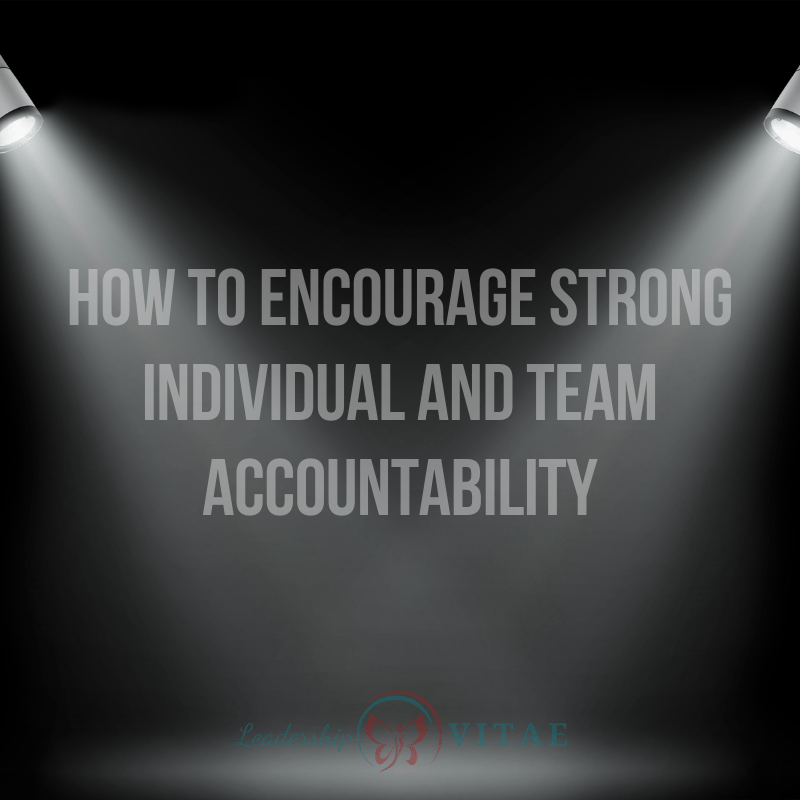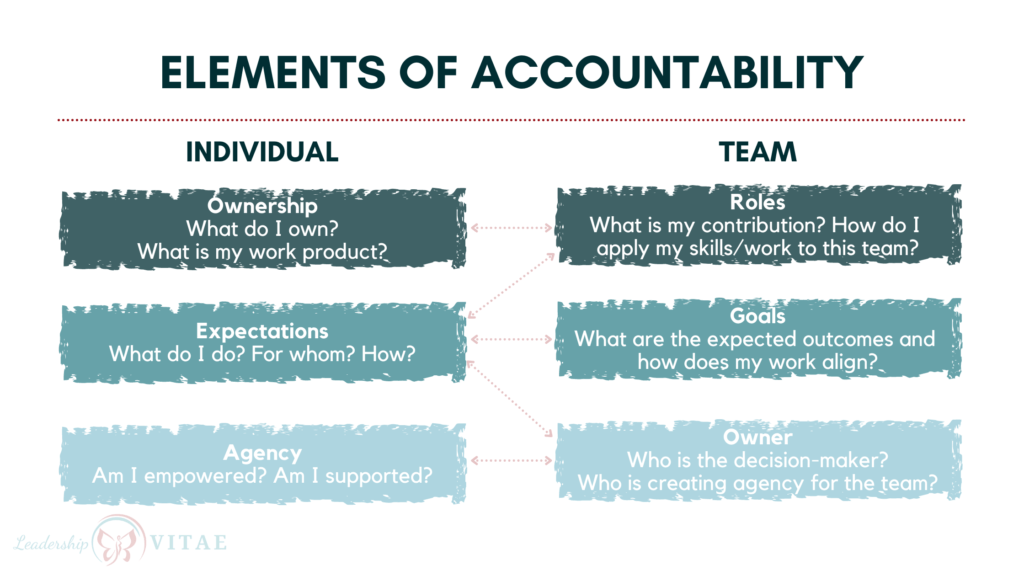
In the past several months, I’ve spent a lot of time thinking about interdependence as the intersection of accountability and collaboration.
Collaboration is a relatively straight-forward term. However, when talking about accountability, there is a lot of confusion as to what it is and isn’t.
After a lot of research and conversation, nothing felt quite right.
The definition of accountability is “the state of being accountable, liable, or answerable.” Nothing like having the word be part of the definition.
It also implies, or creates a sense of, negative consequence. Someone who is liable or answerable…the unspoken part of that is “when something goes wrong.”
If we want to embrace accountability, first we have to recognize it as something positive and healthy, not as a stick to punish. Second, we have to do better at defining what accountability is. Starting with its core ingredients.
Individual accountability
During a conversation on the topic with a fellow leader, colleague, and friend, he shared what he saw as the core components to individual accountability. They are Agency, Ownership, and Expectations (or Outcomes).
Ownership is often what people think about when they think Accountability (like the A in RACI). Where am I the decision-maker? We can always own our personal decisions and actions, even if we do not own those of a team or project. A sense of ownership is reflected in our work product, behaviors (how we show up), and contributions.
Agency is recognition by others of that ownership. Do we have the authority or power to make decisions? It is difficult to be A in a RACI without empowerment. Agency backs up ownership with clarity of our role or leader support.
Expectations are just what they imply. What am I expected to do or deliver? What outcomes do I drive, achieve, or contribute to? Ultimately, what are we applying our accountability to?
With this as a framework, individual accountability is having clear expectations, a sense of ownership in meeting those expectations, with the empowerment to do so.
Team Accountability
Researching team accountability, I found a lot of articles with various recommendations and factors to consider. Ultimately, three components to team accountability stood out across all the various research. They are Roles, Goals, and Owner.
We rarely accomplish anything alone in life and work. When we come together, formally or informally, to pursue an outcome, it makes us part of a team. In a team, there are roles each of us are filling, based on our contribution. There may be someone who is leading the team, and others who are performing specific tasks or creating specific deliverables, based on their skills. Knowing our role is foundational to team accountability.
Teams come together to achieve some sort of outcome. These are the goals – ideally tangible and measurable – of the team. Without clarity of goals, everyone on the team may be pursuing something different.
In the case of a team, the owner may be a direct member of the team, or leader who is ultimately accountable for its success or achievement of goals.
Together, team accountability is having a group of people in various roles, working together towards common goals, with a clear owner to guide decisions and direction.
Bridging Individual and Team Accountability

As an employee (or member of a family/community/etc), we can demonstrate personal accountability and accountability as part of a team.
Knowing the role we play matters. We can have a sense of ownership for our own work, and be an owner for team outcomes. We may own our work, and contribute that work to achieve team goals.
It’s also possible to be on several teams. We may need to understand how we – and our work – contributes to the success of those teams.
Ultimately, we can embrace our individual accountability in a team construct. We can understand the expectations of us in each of those roles, own our work and behaviors, and ensure we have the support/agency needed to be successful.
There is certainly overlap and commonality between different flavors of accountability.
Ownership is a common element between individual and team accountability. What do we own? What is someone looking to us to decide or drive?
Expectations and goals are similar, but different. What is expected of us in our individual capacity, the role we’ve been assigned, and do they align to the goals of the team? If expectations do not align, it’s worth looking for clarity.
As an individual, agency still matters. In a team, the role we play in achieving goals should give us the agency we need to feel supported and empowered. If not, clarity of roles, goals and owner may be needed.
Accountability culture
Accountability is not just for leaders. Each of us can practice individual accountability in our work. As long as we understand expectations, have a sense of ownership in our work, and feel empowered to make decisions around it.
Accountability starts from within. Embracing and demonstrating ownership in what we do and how we show up. That part is possible for each of us, no matter where we work or what we do.
However, when expectations are not clear, or we don’t feel empowered, accountability suffers. As leaders, if we see folks in our organizations with their heads down, potentially stagnating, maybe there’s an accountability gap.
Consider whether there are clear expectations and a sense of empowerment in the team. It may be that teams want accountability, but there are elements missing in the culture to help make it possible.
If elements of accountability are present, but it’s still not happening, consider how it is used. Is accountability avoided because it’s used as a stick when things do not go well?
Healthy accountability creates a safe environment to embrace learning, a growth mindset, or “failing fast.” Companies with these cultures reward learnings that come from mistakes, instead of looking for who to shame and blame.
Next steps
If we, as individuals or members of teams, want to be accountable and are struggling with missing components or cultural challenges…we can hold ourselves accountable to speak up.
I’ve struggled in the last few years with agency and role clarity, compromising my sense of accountability and that of my team. Over the last few months, as I’ve sought to define what healthy interdependence looks like, I’ve spoken up about challenges to embracing accountability. About what I need – and what I need to provide my team – to encourage the accountability culture the company is committed to moving towards.
With supporting language around ownership, agency, roles, goals, and expectations, it has become easier to create clarity for myself and with my peers, leader, and team. These are critical steps if I want to practice accountability myself. And I cannot expect to create a culture of accountability unless I do.
Have you struggled with accountability in your role, team, or organization? What have you found helpful? Please share your experience or suggestions in the comments.








